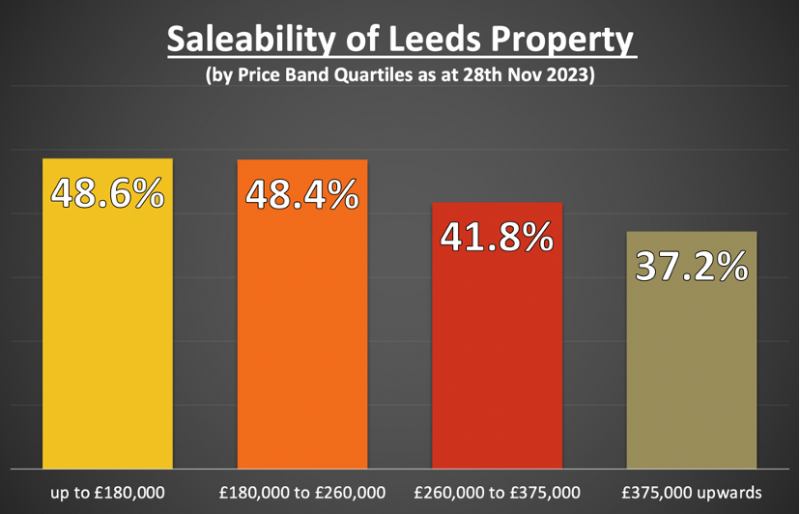SEARCH FOR PROPERTIES NOW...
Student
Professional
Leeds Property Market: Which homes are selling the best?
Inflation, interest rates, house prices down, house prices up ... the newspapers are full of column inches on Brit’s second favourite topic - the property market (the first being the weather obviously!).
Those of you that read my articles on the Leeds property market know I like to look further afield to compare the Leeds market with the regional and national markets. The one thing that is immediately apparent is that the UK does not have one property market.
House prices are up in one region of the UK, yet down in another. It is a hotchpotch patchwork (almost like a fly’s eye) of lots of small property markets all performing in different ways.
… and that made me think …
Is there just one Leeds property market or many?
So, I decided to dive into the dynamics of the Leeds housing market, to see if it operates as a singular entity or if the diverse price ranges significantly influence a property's saleability.
This curiosity stems from the observation that properties, much like a spectrum, range from modestly priced to premium priced. Such variations in pricing could potentially carve out distinct segments within the market, each with its own trends and buyer behaviours. I decided the best way was to split the Leeds property market into four equal sized distinct price ranges, each representing a unique slice of the market.
Imagine the entire range of house prices as a four-layer cake.
The lowest quartile forms the base layer, representing the most affordable 25% of homes – these are typically the most accessible for first-time buyers and buy-to-let landlords. Next up is the lower middle quartile, the second layer, encompassing properties priced between the 25th and 50th percentiles. These homes offer a step up in features, style or location while remaining within a moderate price range.
Ascending further, the middle upper quartile, the third layer, includes homes priced between the 50th and 75th percentiles, appealing to buyers looking for more amenities or premium locations. At the top sits the upper quartile, the cream of the crop, representing the most expensive 25% of properties in Leeds. These homes are often luxurious, boasting high-end features and coveted locations, and are sought after by those who desire the best the market has to offer.
By segmenting properties into these quartiles, we gain insight into their saleability and can tailor strategies to target buyers effectively within each segment.
These are the quartile/house price bands for Leeds:
- Lowest Quartile - (0 to 25% quartile in terms of house value) - Up to £180,000
- Lower Middle Quartile - (25% to 50% quartile in terms of value) - £180,000 to £260,000
- Middle Upper Quartile - (50% to 75% quartile in terms of value) - £260,000 to £375,000
- Upper Quartile - (highest 25% quartile in terms of value) - £375,000 upwards
So, having split the Leeds property market approximately into four equal sizes, the results in terms of what price band has sold (subject to contract or stc) the most is quite enlightening -
of what price band has sold (subject to contract or stc) the most is quite enlightening -
|
Leeds |
Available |
Sold STC |
% Sold |
|
up to £180,000 |
1099 |
1040 |
48.6% |
|
£180,000 to £260,000 |
1035 |
971 |
48.4% |
|
£260,000 to £375,000 |
1005 |
721 |
41.8% |
|
£375,000 upwards |
1077 |
637 |
37.2% |
The statistics across various price ranges present an interesting pattern. For properties priced up to £180,000, there are 1,099 available, with 1,040 already sold subject to contract (STC), representing a 48.6% sale rate.
In the next price band, £180,000 to £260,000, there are 1,035 properties available, with 971 sold STC, accounting for a 48.4% sale rate.
The £260,000 to £375,000 range shows 1,005 properties on the market, of which 721 have been sold STC, indicating a 41.8% sale rate.
Lastly, for properties priced at £375,000 and upwards, there are 1,077 available, with 637 sold STC, resulting in a sale rate of 37.2%.

The best performing price ranges/quartiles in the Leeds area are the lower quartile and lower middle quartile markets, with the upper quartile (the top 25%) range finding things tougher.
In analysing the Leeds property market, it's clear that the dynamics are multifaceted and cannot be neatly categorised under a single umbrella.
The market's behaviour is akin to a kaleidoscope, with each turn revealing a different pattern based on the price segment. This diversity in performance across various price bands/quartiles is indicative of a market that caters to a wide spectrum of buyer preferences and financial capacities.
The most illuminating insight from this investigation is the relative success of different price quartiles.
The lower and lower middle quartiles, encompassing homes up to £260,000, have shown remarkable resilience, with a high percentage of properties going under contract.
This trend likely reflects a robust demand from first-time buyers and investors in moderately priced Leeds properties.
In contrast, the upper quartile, representing the most expensive homes, faces a more challenging landscape. With a lower percentage of homes sold, this segment could be experiencing a slowdown, possibly due to its limited buyer pool or the broader economic factors affecting higher-end property investments and underlines the need for realistic pricing.
This disparity in market performance underscores the importance of understanding Leeds’ property landscape through a segmented approach.
By recognising the unique characteristics and demand drivers within each quartile, estate agents, buyers, and sellers can make more informed decisions.
Back to news









